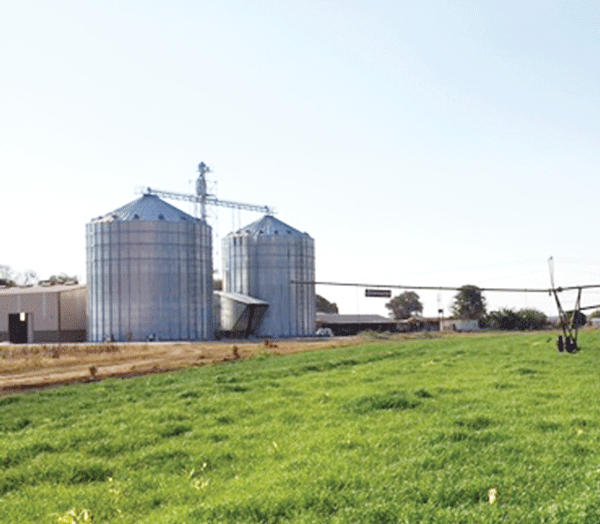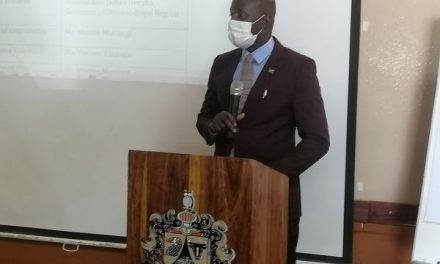
Phosphates in Okuruso tailings for crop fertiliser

Mr Eben Visser, Namibian Agronomic Board research and development consultant with the Minister of Agriculture, Water and Forestry, Hon. John Mutorwa, in the laboratory where phosphate is extracted on an experimental basis from the tailings of Okuruso Fluorspar mine.
Last week, the Minister of Agriculture, Water and Forestry, Hon John Mutorwa visited an innovative collaboration between the Namibian Agronomic Board and Okorusu Fluorspar Mine, to extract phosphates from the mine’s tailings dams. Okuruso is situated between Otjiwarongo and Otavi.
The experimental project shows that phosphates can be extracted from the tailings to be used as fertiliser for crops and as a vital ingredient for livestock feeds. The next step in the process is to step up production as a continuous process in a small-scale pilot laboratory to test if it is commercially viable.
The project was initiated when farmers in the area realised that phosphates in the mine tailings could possibly be extracted and used as commercial fertiliser for crops in the Maize Triangle. The idea took hold at a time when the price of phosphate fertilisers became highly inflated and a viable alternative was needed. Following the lead, the Namibian Agronomic Board approached the Okorusu Mine to explore the viability of the idea. “The Okorusu Mine management are the most forthcoming people and made available at no cost as part of their social responsibility, their facilities for the project to take shape,” says Mr Christof Brock, CEO of the Namibian Agronomic Board. “The Agronomic Board secured the services of a research and development consultant, whilst Okorusu provided the laboratory and accommodation and made substantial contributions in kind” said Brock.
The research and development consultant and chemist on the project, Mr Eben Visser, has been intensely engaged in extracting the phosphates in the laboratory environment for a number of years. Visser is confident that the project at full scale production is feasible. “The mining process at Okorusu contributes significantly to the success of this initial phase of the project because after blasting, the rock is ground quite fine, making our laboratory work that much easier,” explains Visser. The alternative would be for the Namibian Agronomic Board to set up and operate a rock crushing section that would immediately bring into question the financial viability of the project.
Mr Mark Dawe, Managing Director of Okorusu Fluorspar Mine was encouraged by the outcome of the pilot study and is committed to lending further support in taking it to full production should full scale production prove to be viable. “What is left to do now is calculate the cost of full scale production to assess whether production can be sustained in the longer term. We sincerely hope that this will be the case,” he said.
Extracting such a valuable product from the waste of mining activity in the area is not limited to the extraction of phosphates only. “A by-product of the laboratory process, almost by accident, is liquid calcium nitrate,” says Brock. “Calcium nitrate is sought after in the horticulture industry which contributes to the taste and improved shelf life of products such as potatoes,” he elaborates.
The case for progressing from the existing pilot phase to full production is compelling and feasible on many different levels. In addition to the abundance of the phosphate compound in the tailings of the mine, the significant reduction in cost to farmers is an advantage since a significant part of the local cost of fertilisers comes from transport.
Mutorwa commended the project and was encouraged by the potential of job creation for Namibians and import substitution of phosphate for agronomy. He is enthusiastic about the prospect of having a fully fledged phosphate extraction plant in Namibia.












































